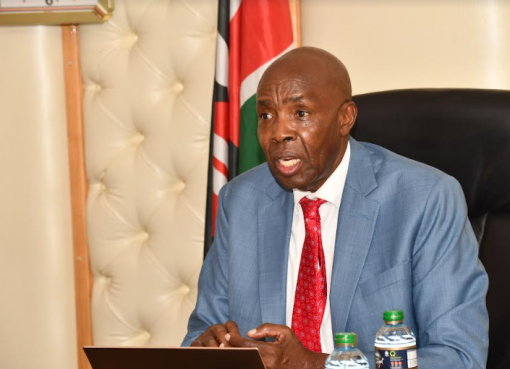
Integration of Information Communication Technology (ICT) popularly known as Digital Literacy project (DLP) in primary education in Kenya is one of the key flagship programmes highlighted by the government.
The government in 2016 launched free tablets to lower primary school pupils in classes one to three in its efforts to integrate Information and Communication Technology (ICT) in the school curriculum.
This is expected to go a long way in improving not only digital literacy in the country, but also encourage more pupils to enroll in school by making this learning interactive and interesting.
DLP is Kenya’s national ICT program that aims to improve learning and build 21st century skills among primary school students through the use of digital technologies in education.
Lucy Mwelu, a student in Maasai Mara University is living her dreams through the transformed digital Kenya.
Despite Mwelu being an Agricultural Economics student, she has been practicing her talent and hobby in writing. Through the internet, she has managed to write three books with over 50 chapters each.
Back in primary school, Mwelu had a dream of becoming an author. “I wanted to venture into creative writing. I loved comic books and I spend hours reading them every day after school before I do my homework,” she said.
Because she had no access to the internet, she used to borrow books in the library which helped to boost her grammar and vocabulary.
“In class seven, I used to write long compositions that made my English teacher complain instead of normal two-page composition as I used to write six pages but I had no choice because the ideas would just flow,” she said.
Mwelu horned her writing skills in Mbooni Girls` High School with the help of her English teacher whom she remembers fondly as a Mr. Kyalo who advised her to embrace her talent. “Mr Kyalo advised me to buy an extra book so that I can practise my writing,” she says.
She wrote her first manuscript called City Under Water Atlantis in Form Three which she photocopied and gave to her fellow students in school. When she finished high school, Mwelu got her first smart phone which transformed her writing skills to the next level.
“Through the writing apps on the internet, I was able to advance my writing,” she says. “I was introduced to Watt pad; a writing android application where writers all over the world can publish their work online,” she adds.
Through her mobile phone, Mwelu could read different novels online and also get a chance to live her dream of being an Author.
Mwelu has so far written three novels namely, The Open Road, Facing Your Demons and The Outcast. The books are set in a Kenyan context and have been written in English with some bit of Swahili to create more interest to her readers and appeal to the younger generations.
“Her first book, The Open Road, has over 4, 000 views. “Watt pad provides a channel in which my fans can comment on my story and that has helped me to correct some of the mistakes I make. At first, building up a climax of a story in my novel was a major problem but I can confidently say that Watt pad novels has helped me so much in this area,” says Mwelu.
The Open Road reveals the lives of underprivileged people. It’s set in the sprawling Kibera slums in Nairobi, one of the largest slums in Kenya. The book reveals the social ills among them injustice, social stratification, corruption and romance.
Facing Your Demons also deals with social ills and poor governance among others and how they come back to haunt the society or individuals.
The Outcast on the other hand is a thrilling action packed piece of work dwelling on themes such as power struggle, family loyalty, test of faith and love. She is now gearing herself for the skies as she looks forward to starting writing and publishing locally.
Mwelu plans to study literature online in future in a bid to improve her writing skills as the internet has made this easier nowadays. “Registered universities offer courses online and one can take the course, do an exam and be awarded a certificate,” she adds.
Apart from writing novels, Mwelu writes scripts for plays which helps to finance her in campus for schools and churches while exploring various themes.
She advises fellow youths to use the internet wisely and work to hone their talents as there were many opportunities out there.
Mwelu`s case is an excellent example of what the digital literacy programme in the country will be able to do if implemented properly. Thus the programme will spur creativity among our young people and help nature their talents. This is because the world is going digital in every aspect and only those who embrace this change will be able to realize their dreams. Lots of business and employment opportunities are now found online and the youth could benefit if they embrace the emerging trends in technology.
But successful implementation of the Digital Literacy Programme in schools will depend upon the capacity of primary school teachers and education managers to fully harness the power of technology to enhance student learning.
It is expected that all 23, 000 public primary schools in Kenya would be equipped with 1.2 million digital devices.
The main aim of the project is aligning integration of ICT into teaching and learning for class one pupils in primary schools and help our young people to embrace ICT at an early age.
The government targets to improve not only ICT infrastructure, develop of digital content, capacity build the teachers and procure more ICT devices for schools but also the general ICT sector in the country as it is a major driver of the economy.
But with limited internet access and lack of access to power or many power outages in schools, the country’s digital education appears to be facing a major challenge which is slowing down digital literacy.
Digital education is the ultimate equaliser which reduces the gap between the rich and the poor in the country. It does not remove all obstacles but it levels the playing field.
By Mabel Keya-Shikuku/Alex Tanui



